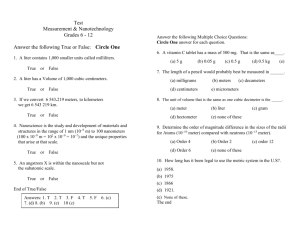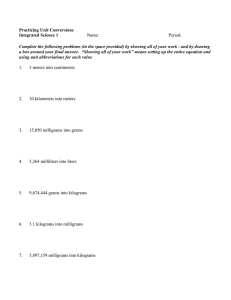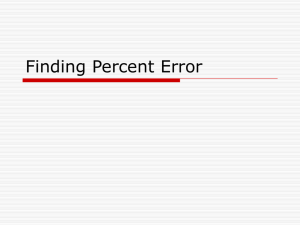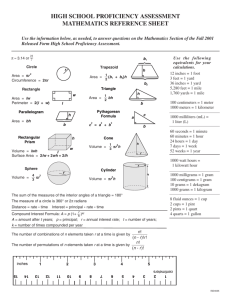Unit Conversions
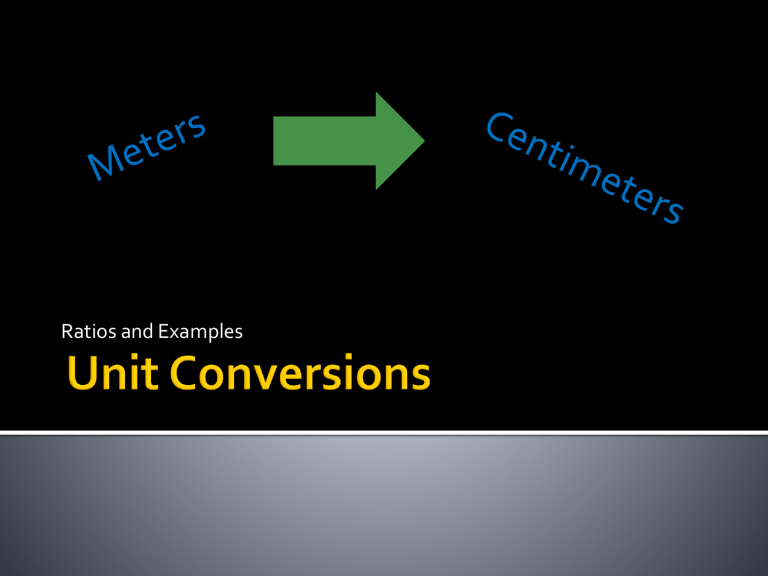
Ratios and Examples
Distance- US
1 inch= 2.54 centimeters
1 foot= 12 inches
1mile= 5280 feet
1 yard= 36 inches
1 mile= 5280 feet
1 yard=3 feet
Distance- Metric
1 centimeter= 10 millimeters
1 meter=100 centimeters
1 meter=1000 millimeters
1 kilometer= 1000 meters
1 meter= 39.37 inches
1 meter= 1.06x10^ -16 Light years
1 meter= 0.00021 miles
1 meter= 1.0936 yards
1 meter=3.28 feet
Volume- US
1 cup= 8 ounces
1 pint= 2 cups
1 quart= 2 pints
1 Gallon= 4 quarts
Temperatures
1 Kelvin= -272.15 o C
1 Kelvin= -457.87
o F
o C= ( o F-32)
1.8
Time
1 minute= 60 seconds
1 hour= 60 minutes
1 day= 24 hours
1 week= 7 days
1 year= 52 weeks
1 decade= 10 years
1 century= 10 decades
Weight/Mass
1 kilogram=1000 grams
1 gram= 1000 milligrams
1 gram= 0.0022 pounds
1 gram= o.o35 ounces
1 gram= 1.102x10^ -6 tons
1 pound= 16 ounces
1 ton= 2000 pounds
Volume
1 Liter= 0.001 cubic meters
1 Liter= 1000 milliliters
1 Liter= 0.264 gallons
1 Liter= 1.056 quarts
1 Liter= 2.113 pints
1 Liter= 4.227 cups
1 Liter=33.8 fluid ounces
1 Liter= 0.035 cubic feet
When different units are used, sometimes it makes the numbers easier to manipulate
Very large and very small numbers are easier to work with after they are either made smaller or larger
Some equations call for a specific unit
Start by making a grid like this
Next put the unit that you have in the upper left hand space e.g.
Meters
Next place the unit you want to get to in the far upper right hand space.
Meters Centimeters
Now we need to determine what goes into the middle.
This will be a ratio of the unit you have and the unit you want.
For this example we can use the relationship between meters and centimeters
Meters Centimeters Centimeters
Meters
Which unit do you put on top and which unit to put on the bottom?
The unit on bottom much be diagonal to the unit you already have.
Meters Centimeters Centimeters
Meters
Follow the same rules e.g.
Kilograms milligrams
Go from Kilograms to grams, then grams to milligrams
Kilograms Grams milligrams milligrams
Kilograms Grams
Remember: in ratios the number 1 ALWAYS goes with the larger unit.
2 Meters 100 Centimeters 200 Centimeters
1 Meter
How do you actually calculate how much of something you have in the new units?
Every time you see a vertical line multiply
Every time you see a horizontal line divide
2Meters 100 Centimeters 200 Centimeters
1 Meter
2 Meters 100 Centimeters 200 Centimeters
1 Meter
We can also go from smaller units to larger units following the same method.
560 mg 1 g 0.56 g
1000mg
Note : The matching units are still diagonal to each other and the 1 goes with the larger unit.
Example : How many inches are in one mile?
1 mi 5280ft 12 in 63,360 inches
1mi 1 ft
Example : How many milligrams are there in a
0.56 g sample?
0.56 g 1000 mg 560 mg
1 g
Example : How many days are in 54,320 minutes?
54,320 minutes 1 hour 1 day 37.7 days
60 minutes 24 hours
